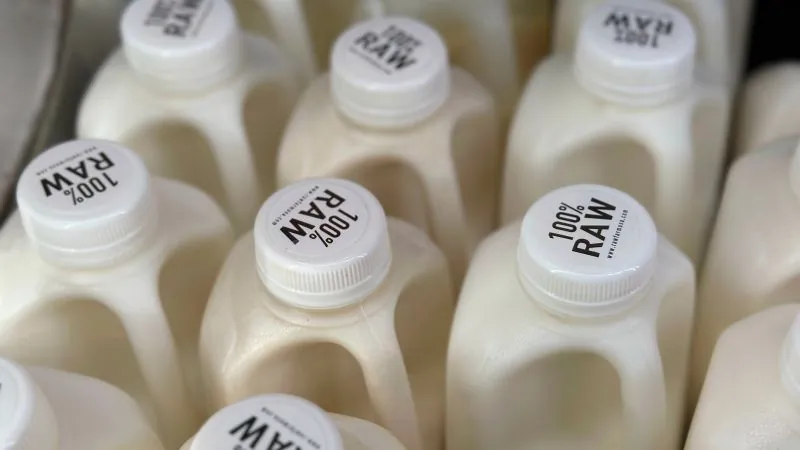
Raw Milk Controversy: California's Rising Illnesses and Expert Warnings
2024-12-13
Author: Wei
Rising Illnesses in California
In a worrying development, California has reported a surge in illnesses connected to the consumption of raw milk, with at least 10 individuals affected, according to the California Department of Public Health (CDPH). While none of these cases has been linked to bird flu, public health officials are taking the situation seriously after multiple recalls of raw milk products were triggered by contamination concerns.
A spokesperson for the CDPH stated, "Initial tests from state and county public health labs have not detected any positive cases of bird flu in these individuals, despite their reported consumption of raw milk." Officials continue to investigate the source of the illnesses, which remains undisclosed.
The alarm has been further raised by an investigation into a potential bird flu case involving a child who fell ill after drinking raw milk in November. This child exhibited flu-like symptoms and was taken to a local emergency room, though initial tests for influenza returned negative results. The Centers for Disease Control and Prevention (CDC) reassured the public that the child's case lacked evidence directly linking it to bird flu.
Health Risks of Raw Milk
Raw milk has garnered increasing popularity, partly due to endorsements from notable figures like Robert F. Kennedy Jr., raising alarm among health experts. Despite claims of perceived health benefits, experts maintain that the risks associated with raw milk consumption vastly outweigh any potential gains. Raw milk is susceptible to a variety of dangerous pathogens and has been implicated in outbreaks of illnesses caused by bacteria such as E. coli, listeria, and salmonella.
In light of these developments, the US Department of Agriculture (USDA) has announced that it will begin testing raw milk stored in dairy silos nationwide to mitigate the risks posed by the virus.
Understanding Raw Milk and Its Risks
Raw milk is milk that has not undergone pasteurization, a critical process designed to eliminate harmful pathogens. The CDC emphasizes that raw milk can harbor dangerous bacteria that may lead to serious health conditions, including diarrhea and stomach cramps. Certain populations, particularly children under five, the elderly, pregnant women, and immunocompromised individuals, are especially vulnerable to these health threats.
To put the raw milk debate in perspective, it's vital to understand the historical context of pasteurization. The practice became widespread in the early 20th century to combat milk-borne illnesses, as a staggering percentage of disease outbreaks were traced back to unpasteurized dairy products. Estimates indicate that for every 2 billion servings of pasteurized dairy consumed, only one person becomes ill—a stark contrast to the risks associated with raw milk.
Despite the superior safety of pasteurized products, a small yet passionate subset of the population opts for raw milk, often citing taste preferences or a desire to support local farmers. However, experts caution that these decisions can be informed by misconceptions surrounding the health benefits of raw milk.
The Bird Flu Threat
In a disturbing twist, the FDA has identified the avian influenza virus (H5N1) as a significant concern associated with raw milk. The pattern of the current outbreak shows a high concentration of the virus in the milk of infected cows, resulting in health professionals urging the public to exercise caution.
Recent figures indicate a notable increase in human bird flu cases in 2023, with California recording 32 of the 58 nationwide cases this year. Many of these cases have occurred among farm workers with direct contact with sick animals. Symptoms of bird flu in humans mirror those of traditional flu, often including fever, body aches, and gastrointestinal distress.
As California's officials and health experts navigate the challenges posed by raw milk consumption and the specter of bird flu, the public is urged to remain vigilant. If you’ve consumed raw milk and experience any concerning symptoms, it’s advisable to seek medical attention immediately.
Conclusion
The ongoing debate surrounding raw milk underscores a broader conflict between health safety and personal choice, with advocates on both sides holding firm in their beliefs. As this issue continues to rise to prominence, the repercussions for health and safety remain clear: choose wisely, and always prioritize informed decisions regarding what you consume.


 Brasil (PT)
Brasil (PT)
 Canada (EN)
Canada (EN)
 Chile (ES)
Chile (ES)
 España (ES)
España (ES)
 France (FR)
France (FR)
 Hong Kong (EN)
Hong Kong (EN)
 Italia (IT)
Italia (IT)
 日本 (JA)
日本 (JA)
 Magyarország (HU)
Magyarország (HU)
 Norge (NO)
Norge (NO)
 Polska (PL)
Polska (PL)
 Schweiz (DE)
Schweiz (DE)
 Singapore (EN)
Singapore (EN)
 Sverige (SV)
Sverige (SV)
 Suomi (FI)
Suomi (FI)
 Türkiye (TR)
Türkiye (TR)